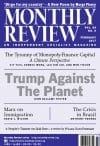Volume 68, Issue 09 (February 2017)

For those attuned to the most fashionable trends in mainstream discourse on climate change, it is clear that “resilience” is now in, and “sustainability” is out.… The concept of resilience, while adopted by some progressive thinkers and organizations, is nonetheless being rapidly incorporated into a survival-of-the-most-resilient philosophy in which poor nations, and indeed exploited and dispossessed people everywhere, are told they must simply become more “resilient” in order to survive—but in a world in which such dynamic adaptability is available mainly to the rich, who enjoy monopolies of capital, resources, and technology. | more…

It would be wrong…to see the new administration as simply a cabal of ignoramuses, beginning with the climate-change-denier-in-chief himself. Rather, their efforts to undermine even modest regulations and to discredit sound science are necessary parts of an attempt by carbon capital to proceed undeterred with burning of fossil fuels, as if this did not constitute a dire threat to the human species.… Today virulent anti-environmentalism, tied to a broader neo-fascist politics linked to white supremacy, is the backfire being ignited against both efforts to combat climate change and the larger movement for social and environmental justice. | more…

Marge Piercy is the author of many books of poetry, most recently Made in Detroit: Poems. | more…
Workers, Wages, and Legal Status
Given the intense and often bitter debates over immigration now taking place in the United States and Europe…. [Marx’s thoughts on the subject have] received surprisingly little attention from the modern left.… [Marx wrote about immigrant workers] nearly 150 years ago, and he was certainly not infallible, but a great deal of his analysis sounds remarkably contemporary.… [And among his insights, largely ignored by economists and activists alike, is] the one Marx considered “most important of all”: the way immigration can be used to create “a working class divided into two hostile camps.” | more…
Since the 1980s, economic growth in the core capitalist countries has been driven by an enormous expansion of financial capital, accompanied by steady deindustrialization. In recent years, the monopoly power of this financial capital has displayed increasingly tyrannical characteristics: it depends for its continued growth on ever-increasing indebtedness and dependence in developing nations, widening the divide between rich and poor and ultimately fostering state violence that serves to suppress popular resistance.… [Today,] military and monetary strength work together to profit from inequality and instability in emerging economies. | more…

Corruption, Neoliberalism, and the Primary Sector
In discussing the Brazilian situation, it is easy to focus on the dramas of individual politicians and institutions. But to look only at this level of the crisis is to ignore the deeper economic conditions that have driven the country’s politics to the edge.… The deeper contradiction, however, lies with the natural-resource economy, in which government revenue and social spending require royalties that are controlled by a small, unaccountable elite…. The left’s only viable response…is to demand a radical restructuring of the primary sector and a reinvigorated opposition to neoliberalism. | more…

A Letter to Nicholas Georgescu-Roegen, July 31, 1974
In the early 1970s, MR editors Harry Magdoff and Paul Sweezy increasingly introduced ecological themes into the magazine, and began to question the viability of unlimited, exponential economic growth in a limited biosphere. Sweezy, in particular, was deeply interested in ecological problems, a topic he began to write on in this period, in essays such as “Cars and Cities”…, and to which he returned on various occasions until the end of his life.… [In this 1974 letter to the influential ecological economist, Nicholas Georgescu-Roegen, Sweezy outlined] the revolutionary implications of ecology, and the break that these necessitated with pure “economism”—a rupture that only a truly revolutionary socialism could bring about.

In Acting Like It Matters, James McEnteer gives a compassionate account of John Malpede—actor, activist, and co-creator of the political theatre troupe the Los Angeles Poverty Department (LAPD)—and of the Skid Row community that is the organization’s heart and soul. The story of Malpede and the LAPD is one of life as art and art as life, and its protagonists are the dehumanized homeless citizens of Los Angeles and their compatriots in cities across the United States and the world, who represent a growing part of today’s global working class pushed out of the formal economy. | more…





